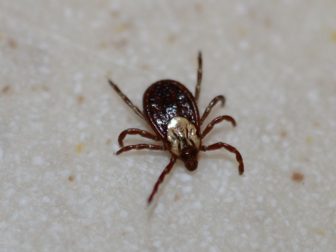The New Canaan Health Department saw a record-high number of ticks submitted last month, officials say.
In all, 51 ticks were submitted to the town in May, according to Health Director Jenn Eielson.

By KSRE Photo – https://www.flickr.com/photos/43276854@N02/27402428362/, CC BY 2.0, https://commons.wikimedia.org/w/index.php?curid=93819085
Of those, seven tested positive for the bacteria that causes Lyme Disease, Eielson said during the June 1 meeting of the Health and Human Services Commission.
“It’s a topic that is [top of mind] right now because of the amount of ticks, because it wasn’t cold enough this winter,” Eielson said during the meeting, held at Town Hall and via videoconference. “It was too mild. They didn’t die off. In fact, the opposite. And people are being much more diligent about doing tick checks when they come back in, so it’s great.” (See the Health Department’s tick info page, including a link to its submittal form, here.)
Eielson added that the Health Department forwards the ticks it receives to the Connecticut Agricultural Experiment Station, which provides free testing. In all of 2022, New Canaan identified 116 ticks and submitted 87 for testing—of those, 16 (18%) tested positive for Borrelia, the spirochete bacteria responsible for Lyme, according to data published by the New Haven-based agency.
Eielson noted that the town scheduled a talk about tick-borne illnesses for June 6 at Lapham and had strong registrations for it.
Commissioners asked about protocol after a tick bite (depends on how long it’s on a person, whether the insect bored under the skin and what an individual’s medical profile is).
Commission Chair Dr. Harrison Pierce noted that there are more tick-borne illnesses than Lyme Disease.
Commissioner Russell Barksdale Jr. said that education is helpful because many people believe there’s no issue with a tick bite as long as the “bullseye” rash doesn’t appear.
“For those of us who know people who have suffered from Lyme Disease for many, many years, it can be debilitating,” he said.
According to the state, tick-borne diseases “can be caused by bacteria, parasites, or viruses, although the diseases caused by bacteria are most common.”
“Several tick species found in Connecticut can spread types of bacteria that can cause illness in humans, and infection with more than one is possible through one tick bite,” according to information supplied by the Department of Public Health. “Symptoms and treatment for each disease depends on the type of bacteria, parasite, or virus causing the illness. There are no vaccines to prevent these diseases. In Connecticut, surveillance is conducted to identify tick-borne diseases spread by ticks in the state and those that might be travel-related (diseases acquired out of the state).”
According to the CDC, Lyme Disease is the most common vector-borne disease in the United States.
Transmitted to humans through the bite of infected blacklegged ticks, symptoms of Lyne typically include fever, headache, fatigue, and a characteristic skin rash called “erythema migrans.”
“If left untreated, infection can spread to joints, the heart, and the nervous syste,” the CDC said. “Lyme disease is diagnosed based on symptoms, physical findings (e.g., rash), and the possibility of exposure to infected ticks. Laboratory testing is helpful if used correctly and performed with validated methods. Most cases of Lyme disease can be treated successfully with a few weeks of antibiotics. Steps to prevent Lyme disease include using insect repellent, removing ticks promptly, applying pesticides, and reducing tick habitat. The ticks that transmit Lyme disease can occasionally transmit other tickborne diseases as well.”
Tick borne diseases are a peril, and we should be vigilant. But there are more effective methods of prevention, with less impact on pollinators and the environment, than spraying pesticides. Please think about the options before hiring vendors who promise to deliver a tick-free (or mosquito-free) lawn.
Fortunately there may be some good news on the horizon for lyme disease. At my clinical research site we have an on going phase 3 study for a new lyme vaccine. While it is still too early to say anything about efficacy it has thus far proven to be generally safe for adults and kids. We will have another company’s early phase lyme vaccine trial for adults starting soon so hopefully we will have some preventatives beyond hyper vigilance available in the next few years.
Every year we always apply Triazicide Insect Killer for Lawns around our house…and ever since using it we’ve had no problems with ticks and other insects…and it also works on burrowing Groundhogs which was the reason we used it to begin with…
check this site https://www.austintexas.gov/sites/default/files/files/Watershed/growgreen/products.pdf
Triazicide is listed under Spectracide. It’s toxic to birds, bees, etc. and lasts in the soil.
All of these “biocides” (marketed as insecticides but kill everything) are completely unable to distinguish between what organisms they kill. They’re seriously deadly, and there is plenty of cause to suspect they’re linked to cancer in pets and humans. Stay away. I check our dogs for ticks, check myself for ticks, and enjoy a poison-free backyard.
The town does not use pesticides on its ballfields or other open areas and they have a contracted private company that uses organic fertilizers on the town fields. The run-off of all the inorganic chemicals and pesticides are a major ecological problem. Also the push to put in artificial turf fields creates other environmental problems that have been documented as well with the problem of toxic microplastics connected to them.